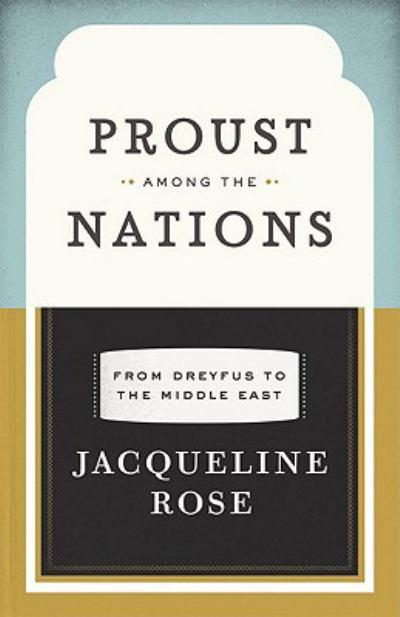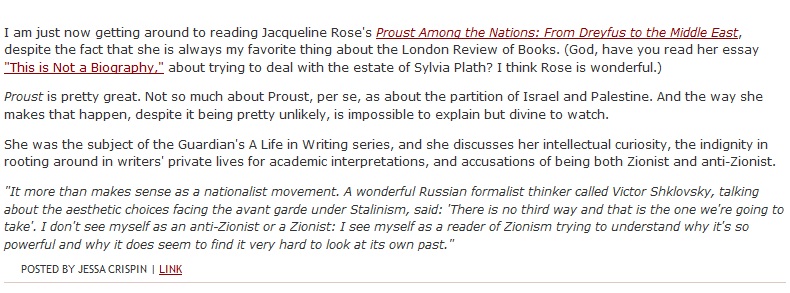Jacqueline Rose among the Nations
It’s International Women’s Day, and after embarking on our own etymological lesson on the Middle English plural, we learned about “womyn’s” slip into print, through the works of Scottish writer James Hogg. Though his work was later championed by André Gide, Hogg was a bit of a bumpkin (eulogized by Wordsworth as the “Shepherd-poet,” but with a grain of salt under the tongue—see W.’s notes on “Extempore Effusion upon the Death of James Hogg” at the University of Virginia Library). The Private Memoirs and Confession of a Justified Sinner is a gothic metafiction at its best—”Sinners in the Hands of an Angry God” doing an H.P. Lovecraft short, as told to Umberto Eco, complete with editorial narratives and doubling anti-heroes—and the subject of some powerful thought by the late, great Eve Kosofsky Sedgwick (1950–2009) in Between Men: English Literature and Male Homosocial Desire.
So, Hogg gave us “womyn”—and we run with it—but how else to celebrate the day? (Consider working with Kiva to microfinance a variety of projects for/by women across the globe?)
Jessa Crispin, founder of Bookslut, celebrated with excitement about our recently released book by Jacqueline Rose,  Proust among the Nations: From Dreyfus to the Middle East. Proust among the Nations literally redresses the Israel-Palestine conflict in distinctly Western garb, and extends its nuanced analysis that begins with Freud and Proust to a variety of artists, writers, and scholars across the Middle East.
Proust among the Nations: From Dreyfus to the Middle East. Proust among the Nations literally redresses the Israel-Palestine conflict in distinctly Western garb, and extends its nuanced analysis that begins with Freud and Proust to a variety of artists, writers, and scholars across the Middle East.
What Jessa’s post—screenshot below—really gifted in commemoration of the day was the suggestion to revisit Rose’s 2002 essay (“This is not a Biography”) for the London Review of Books on her squabbles with the Sylvia Plath Estate, the dubious nature of “truth” in biography, the dynamics of character assassination, and the political consequence of identity.
If you already know you’re a fan of Jacqueline Rose and her work, I strongly encourage you to pick up Proust among the Nations, or even Seagull Books’s Conversations with Jacqueline Rose. If you haven’t read Rose before, well then, I leave you with this blistering candle on the International Women’s Day cake:
In the case of Plath, the subjective component of all biography takes on a special edge. Someone has to be guilty. Someone is to blame. And if someone is going to be proclaimed guilty, then someone else – the person telling the story – has to be certain. Plath biographies are remarkable for their rhetoric of conviction. We are in a court of law, the biographer is mounting her case. Beyond the normal demands of biographical discovery – the search for the crucial detail, the painstaking reconstruction of every facet of a world (biographies, as we know, are getting longer and longer) – incriminating evidence is being gathered. Plath biographies tend to answer each other, shouting like opponents across a legal gulf, each one insisting that it has a greater claim to the truth than the one that went before (why otherwise write a biography at all?). The greater the fervour, the fiercer the claim. In the case of Plath, truth is not just subjective, it is mortal. To die for.
Perhaps the link to pursue, then, is not the one between passion and truth, but between truth and death. Between being so knowing, and touching on the one thing that – as the cliché puts it – no one can ever know. Something untellable, but which has to be told, enters the frame when the subject of biography dies by her own hand, when death arrives too soon. And if that subject is a woman, there is always the risk that femininity will take on a deadly hue. In Freud’s reading, Cordelia – the ‘most excellent’ of the three sisters – becomes, in her dying moments, the ‘Goddess of Death’. In Lear’s arms, she is in fact carrying him, bringing him to the point where he will ‘make friends with the necessity of dying’. A woman is never more deadly than when so perfect, so innocent – like Cordelia – of any crime. Once the link is made, it is a no-win situation for the woman. Plath’s story offers us the same combination of elements, but more nakedly. Let the dead woman carry the can.

